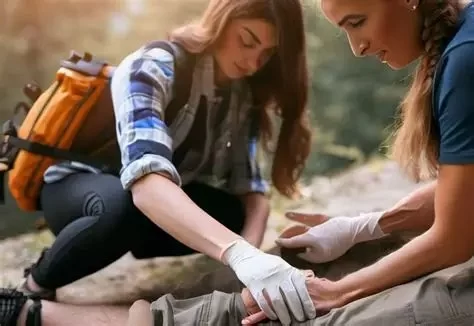Learn the principles of outdoor first aid for all ages, including expert guidance for children, adults, and seniors. Discover practical advice, real-life cases, and recommendations from Pine Cliff Resort.

- why-every-age-group-needs-customized-first-aid
- core-principles-of-outdoor-first-aid
- special-first-aid-considerations-for-children
- first-aid-essentials-for-senior-campers
- training-and-preparedness-for-families
- real-life-camping-emergencies-and-how-they-were-managed
1. Why Every Age Group Needs Customized First Aid
Not all first aid approaches work the same for everyone. A scraped knee on a child, a twisted ankle on a teen, or heat exhaustion in a senior requires vastly different care. When camping with family, understanding outdoor first aid tailored to each age group is not just practical—it's essential.
For example, young children may not clearly communicate pain or discomfort. Teens may downplay injuries to avoid missing out on activities. Seniors may have pre-existing conditions or slower healing responses. At Pine Cliff Resort, our staff often guides visitors on how to treat these differences with appropriate care—sometimes even before medical professionals can arrive.
Customized care starts with awareness, and that’s the first step toward a safe, enjoyable outdoor experience for everyone involved.
2. Core Principles of Outdoor First Aid
The wilderness presents a unique set of challenges: limited access to healthcare, environmental hazards, and the need for self-reliance. These core principles form the foundation of wilderness first aid tips that everyone should know:
- Assess the situation calmly. Panic leads to mistakes. Take a deep breath, observe your surroundings, and prioritize safety.
- Stop bleeding and stabilize injuries. Use gauze, bandages, and splints when needed. Knowing how to improvise is crucial in remote areas.
- Clean and protect wounds. Outdoor cuts are often contaminated. Clean with clean water or antiseptics before bandaging.
- Monitor and record symptoms. For longer hikes or overnight stays, note any changes in behavior, swelling, or temperature.
Knowing these basics ensures you can handle most common outdoor situations, even with minimal gear. Many Pine Cliff Resort visitors have avoided ER visits simply because they followed these golden rules early on.
3. Special First Aid Considerations for Children
Children are curious and energetic—which often leads to minor mishaps. From insect bites to cuts, bumps, and dehydration, treating kids during camping trips involves more than physical care.
Communication and trust are key. Calmly explain what’s happening and what you’re doing to help. Avoid frightening words like “hurt” or “blood.” Instead, use soothing tones and offer reassurance.
Also, tailor supplies to a child's needs:
- Colorful band-aids and smaller gauze pads
- Pain relievers suitable for their age group (acetaminophen or ibuprofen)
- Allergy meds for insect stings or plant reactions
One parent staying at Pine Cliff Resort recounted how a bee sting nearly ruined their weekend. Fortunately, quick treatment with antihistamine, ice, and reassurance calmed the child within minutes. The lesson: pack and plan with your child's common reactions in mind.
4. First Aid Essentials for Senior Campers
Older adults often face additional risks outdoors—heatstroke, joint injuries, or medication complications. Seniors should carry a basic health summary card listing allergies, medications, and chronic conditions.
Watch for signs of overexertion:
- Unusual fatigue or dizziness
- Shortness of breath
- Swelling in legs or feet
Mobility tools such as trekking poles, folding chairs, or medical alert devices are also advisable. A senior guest at Pine Cliff Resort once developed lightheadedness during a guided nature walk. Because their partner carried electrolyte tablets and a detailed med list, the situation was managed quickly without needing evacuation.
Compassion and preparation go hand-in-hand for senior campers. Adjust the pace of activities and create rest opportunities throughout the day.
5. Training and Preparedness for Families
While packing supplies is crucial, so is practicing how to use them. Simple training in CPR, wound care, and recognizing heatstroke can empower families and prevent panic in real emergencies.
Here’s how to prepare before your trip:
- Take a weekend first aid workshop together (many are free through local community centers)
- Have older kids help pack the first aid kit so they know what’s inside
- Review trail maps and emergency contacts before heading out
Pine Cliff Resort often hosts family survival classes during summer. One group of guests credited this training for their quick action when their son got a deep splinter on a hiking trail. They handled the injury calmly, removed the splinter, cleaned the wound, and continued their hike safely.
Prepared families are confident families. Knowing how to act—together—builds trust and resilience that lasts beyond the trip.
6. Real-Life Camping Emergencies and How They Were Managed
Stories bring lessons to life. Consider these real situations from Pine Cliff Resort:
Case 1 – The Heatstroke Hiker: A teenage camper ignored hydration warnings and collapsed during a long hike. Fellow campers recognized the signs, moved him to shade, removed excess clothing, and offered electrolytes. The boy recovered quickly without further issues.
Case 2 – Toddler and the Campfire: A toddler brushed against a hot grill and got a minor burn. The parents immediately used cold water, covered the burn with clean cloth, and used pain-relief ointment. Resort staff praised the fast response and reminded others to keep kids a safe distance from cook areas.
Case 3 – Grandfather’s Sprain: A senior guest stumbled near the lake and sprained his ankle. His family immobilized it with a towel splint and ice pack from the nearby freezer box. With crutches borrowed from the main lodge, he was walking again the next day.
These stories remind us that while nature is beautiful, it demands respect and readiness. With the right knowledge, everyone—from toddlers to grandparents—can safely enjoy their time outside.
For the best in outdoor readiness, visit Pine Cliff Resort. From classes to trail maps and custom first aid kits, we offer everything your family needs for an unforgettable—and safe—adventure.
Blake's Skagit Resort & Marina
13739 Rawlins Rd, Mount Vernon, WA 98273, USA
Visit Location PageWest Thompson Lake Campground
449 Reardon Rd, North Grosvenor Dale, CT 06255, USA
Visit Location Page